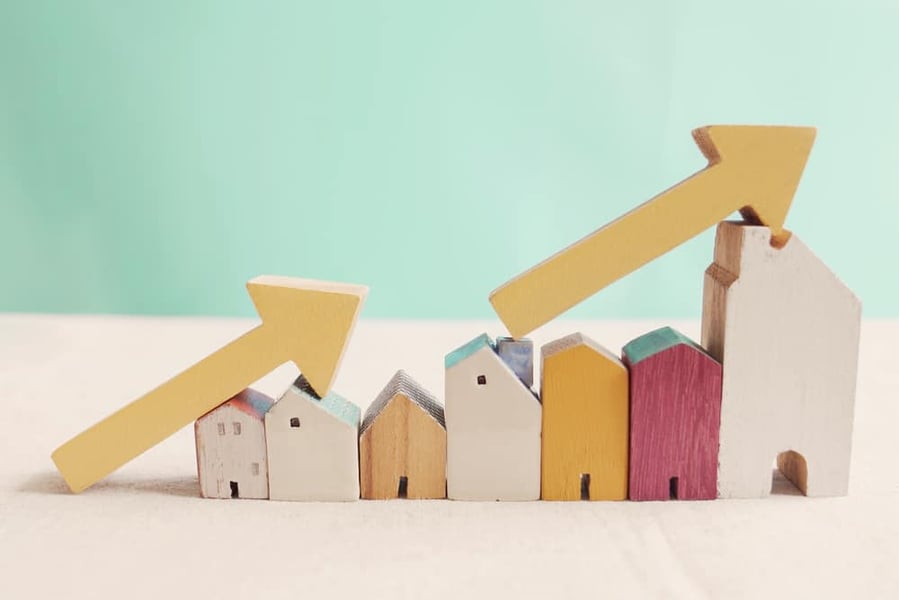Halifax's latest house price index also shows that house prices grew by 1% in November to take the average price of a home to £272,992.

House price growth hit a 15-year high in November as momentum in the market continued to show no signs of abating, according to the Halifax house price index.
Halifax's latest index also shows that house prices grew by 1% in November to take the average price of a home to £272,992. House prices grew by 3.4% on a quarterly basis, which was the strongest reading by this measure since 2006.
Annually prices are up 8.2% but momentum was much slower in London, the historic powerhouse of property price growth, where a rise of just 1.1% was seen. Wales saw the strongest growth during the period.
Russell Galley, managing director at Halifax, said: “Typical values [are] up by almost £13,000 since June, and more than £20,000 since this time last year.
"Since the onset of the pandemic in March 2020, and the UK first entering lockdown, house prices have risen by £33,816, which equates to £1,691 per month.
“The performance of the market continues to be underpinned by a shortage of available properties, a strong labour market and keen competition amongst mortgage providers keeping rates close to historic lows.
"Those taking their first step onto the property ladder are also playing an important role in driving activity, with annual house price inflation for first-time buyers at 9.1% compared to 8.8% for homemovers.”
Tomer Aboody, director of property lender MT Finance, added: "With the highest growth in property prices in more than 15 years, there is continued confidence among buyers.
"Lack of stock means values are being pushed up as buyers take advantage of low interest rates and are prepared to push their personal boundaries when it comes to how much they are happy borrowing.
"More space is still the main requirement for buyers, with quality homes and locations most in demand.
"Although Wales has seen the highest growth in prices and London the lowest, this has to be put in perspective with Wales at the lower end of the value spectrum and therefore more affordable in the first place. For many people, property ownership in London remains out of reach, despite more subdued growth.
"Even with the new COVID variant and possible interest rate increases on the horizon, market sentiment remains impressively strong and resilient."
Sarah Coles, personal finance analyst at Hargreaves Lansdown, said: “The baton has been passed to first time buyers in the final leg of the race for space.
"Demand from first timers means the rising price of flats is now outstripping the rise in prices of the big detached properties we were snapping up earlier in the pandemic.
"There are a few forces at play here. FOMO plays its part. Once prices start to rise quickly, anyone trying to get onto the property ladder starts to feel that unless they buy soon, prices will rise out of the reach of their deposit.
"It means they’re asking for help - both from government schemes like the Lifetime ISA and Help to Buy equity loan, and from their families.
"The Bank of Mum and Dad have seen the value of their own home rise, so they're more comfortable about dipping into the equity in order to find a deposit for their offspring.
"And once they have the deposit in place, rock bottom mortgage deals are a major attraction, because first timers can fix at such low rates that it makes their monthly payments manageable.
"But it’s not just first timers. Some of these smaller properties are likely to be second homes and buy-to-lets. Remortgage figures from UK Finance show that the amount of money people are withdrawing when they remortgage has been rising, and that on average those who remortgage to free up cash for reasons other than debt consolidation or home improvement take an average of £80,000. There’s a strong chance that an awful lot of this is funding another property.
"When we think of second homes we might usually think of a cottage by the sea or in the countryside, but the pandemic has changed the way we live, and may well be affecting second home trends too.
"The growth of flexible and hybrid working means it makes more sense to buy a home where we really want to live, and a small place near work for when we absolutely have to go into the office”



